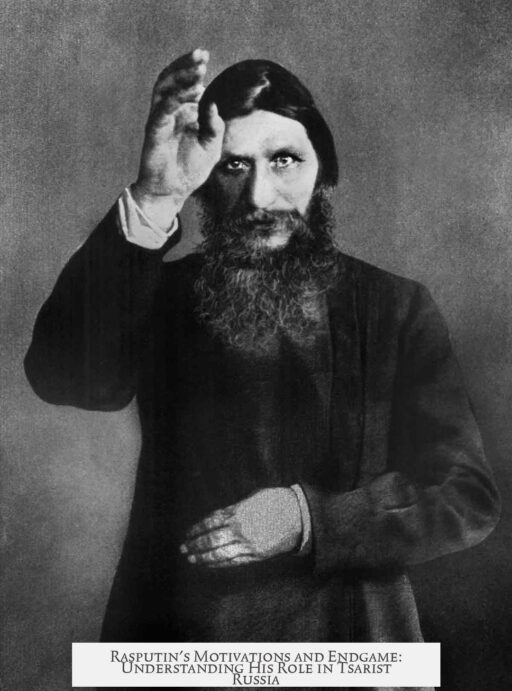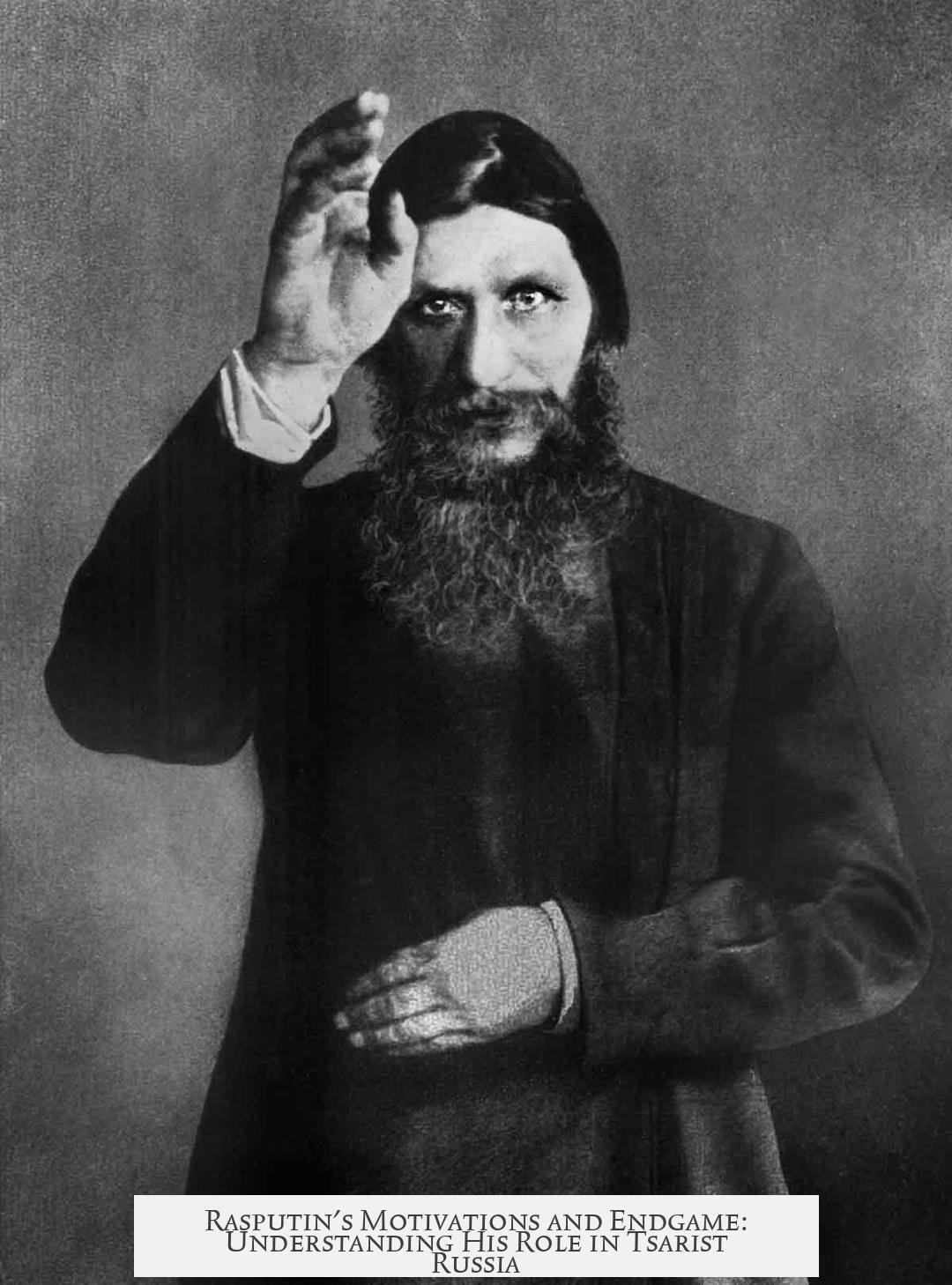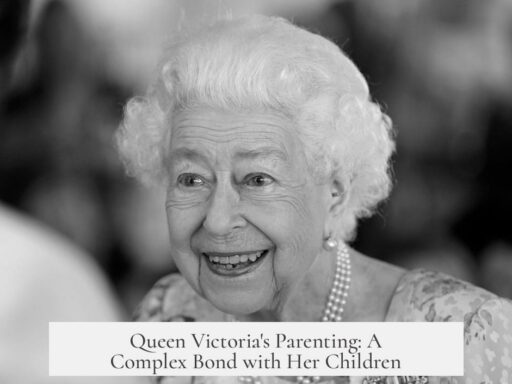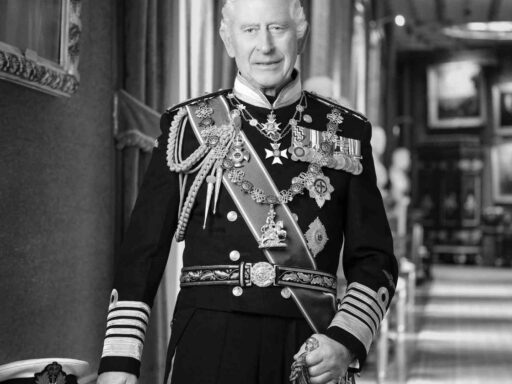Rasputin’s primary goal was not to seize political power but to maintain and increase his influence within the Russian royal family through his role as a mystic healer and spiritual confidant. His claim to fame rested on his supposed healing of Alexei Romanov’s hemophilia. This access allowed him to grow close to Tsarina Alexandra and, through her, hold sway at the highest levels of the Romanov dynasty.
Despite popular perception, Rasputin’s political influence is widely considered overstated. Historians suggest that his input did not cause major political shifts during Nicholas II’s reign. The politics of late Tsarist Russia changed little during Rasputin’s time at court, indicating limited direct power or strategy on his part.
Rasputin’s influence hurt the royal family’s public image more than government policy. Rumors about his relationship with Alexandra, combined with distrust of the Tsarina’s German heritage, fed damaging rumors and undermined Nicholas II’s reputation. These narratives amplified public discontent more than Rasputin’s actual decisions.
Attempts to pinpoint Rasputin’s motives face challenges because his personal beliefs and ambitions remain unclear. He appeared more as a man who seized opportunity rather than a calculated political operator. His rise owed much to being “in the right place at the right time” rather than a deliberate endgame.
His role symbolizes broader issues within the Romanov regime rather than being a root cause of Russia’s political downfall. Rasputin represents tension inside the monarchy and public distrust but was not the mastermind behind the empire’s decline.
- Rasputin sought spiritual influence, not political power.
- He gained access through healing Alexei, the heir’s hemophilia.
- His political impact was minor, with little change during his influence.
- His presence worsened the royal family’s public image significantly.
- Rasputin’s motives remain difficult to define clearly.
- He symbolizes systemic problems in late Tsarist Russia rather than causing them.
What Did Rasputin Actually Want? What Was His Endgame?
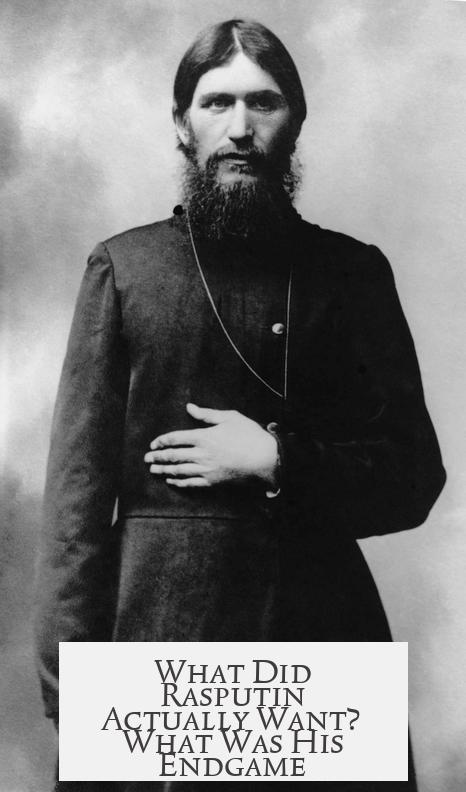
So, what did the infamous Rasputin really want? Was he a shadowy puppeteer with a grand scheme, or just a man thrust unexpectedly into a tempest? The simple answer is: Rasputin’s true desires remain a mystery, but evidence suggests that he was not the political mastermind history often paints him to be.
Rasputin’s life story is one thick with intrigue, myth, and drama, much of it fueled by rumors and the chaotic backdrop of late Imperial Russia. The widely accepted narrative tends to picture him as a manipulator eager for power. However, digging deeper reveals a complex, less sinister man who gained influence mainly through timing and circumstance rather than a calculated blueprint for domination.
The Elusive Motivations of Rasputin
Historians face a tough challenge: deciphering Rasputin’s actual motives. The man was charismatic, sure, and seemed deeply spiritual. But pinning down his personal goals feels like catching mist. He doesn’t come across as someone actively scheming for political control. Instead, he appears more like someone who happened to be in the right place at the right time and made the most of that opportunity.
One key fact: Rasputin earned his way into the Romanov’s inner circle by healing Alexei, the Tsar’s son, of hemophilia symptoms. Whether this healing was medically miraculous or placebo, it won him great trust—and, more importantly, access.
This access was crucial. As Nicholas II’s personal confessor, Rasputin gained a confidential peek into the highest reaches of the Russian monarchy. Yet, it’s vital to emphasize that his rise was less about grand designs and more about personal connection and reputation as a mystic healer.
The Myth vs. Reality of Rasputin’s Influence
Popular history often credits Rasputin with enormous sway over political matters. But modern scholars argue this influence is overstated. Between Rasputin’s ascent and assassination, Russian politics saw hardly any fundamental change directly linked to him.
Imagine casting a shadow bigger than the lamp itself—that’s Rasputin’s reputation on Russian history. His actual role feels more like a reflection of the ruling family’s troubles than the source.
“Rasputin’s greatest impact was probably damaging the public’s image of Nicholas II and his family.”
Consider the scandalous rumors claiming Rasputin and Tsarina Alexandra had an illicit relationship. Though unproven, such tales eroded the already fragile prestige of the monarchy. Add Alexandra’s German heritage—viewed with suspicion amid rising nationalism—the result was a cocktail of distrust. This distrust fostered the belief that Rasputin controlled the Tsar, influencing WWI decisions from behind the curtain. The truth? His actual political meddling was likely minimal.
Why Does Rasputin Get the Blame for Tsarist Russia’s Problems?
Rasputin has often been scapegoated for problems that plagued late Tsarist Russia, but his role was, at best, symbolic. He embodied many issues—clerical corruption, mysticism, and weakened royal authority—more than he caused them. The deep political and social crises Russia faced had roots long before Rasputin found favor.
So where does that leave us? His notorious name carries the weight of a collapsing empire’s woes, but the reality paints a man who was more of an enigma and opportunist than a revolutionary or villain.
Rethinking the Historical Question: What Did Rasputin Want?
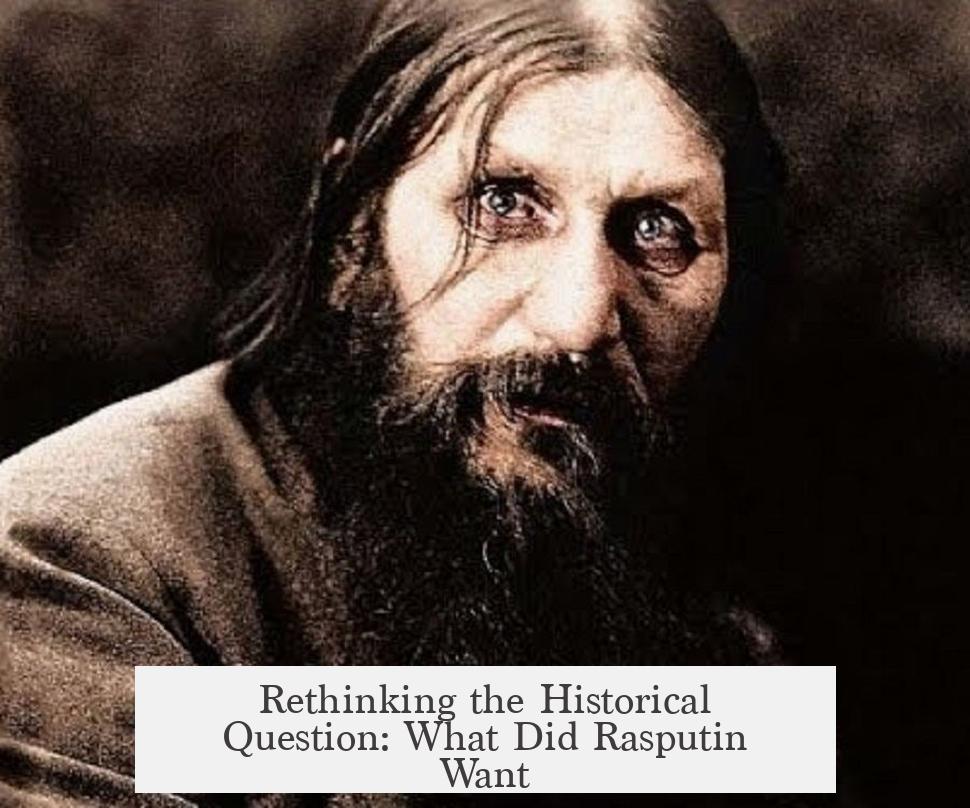
Is asking what Rasputin wanted the best way to understand this turbulent period? Maybe not. The question is “bad” historically—not because it’s trivial, but because it might mislead us into overemphasizing his role. Instead, it’s better to focus on broader forces at play: Russia’s political stagnation, social inequalities, war hardships, and the faltering monarchy.
Rasputin’s story is fascinating, but focusing solely on his intentions can distract from the larger, systemic issues. Instead, look at him as a symbol—a man who rose due to the unique pressures and fragilities within the Romanov court rather than a man with a grand, sinister plan.
Putting It All Together: So What was Rasputin’s Endgame?
- No Clear Political Agenda: Rasputin likely never sought to be kingmaker or dictator. His ambitions appear limited to spiritual influence and gaining favor through healing and confession.
- Access through Healing: The miracle—or perceived miracle—of aiding Alexei’s health gave him steady entry into royal circles.
- Impact on Reputation, Not Policy: His real influence was cultural and symbolic, contributing to public distrust toward the monarchy rather than altering policy decisively.
- Historical Symbolism: Rasputin stands for the decline and dysfunction within the royal family, reflecting wider political and social problems.
Picture Rasputin as a man surfing a monstrous wave he neither controlled nor created. He held on tight, leaving a dramatic wake, but his endgame? Probably just survival, spiritual fulfillment, and personal influence—not an epic coup d’état.
Final Thoughts
The lasting lesson from Rasputin’s story is about how sometimes, history’s great villains aren’t masterminds. They can be opportunists, symbols, or even mere players shaped by circumstances beyond their control. Rasputin’s legacy is a cautionary tale about the dangers of myth overtaking fact and fame overshadowing actual influence.
So next time you hear about Rasputin’s “endgame,” consider this: maybe he just wanted to live up to his reputation as a holy man and offer what help he could. The chaos that followed wasn’t his plan—it was history rolling forward without pause.
What were Rasputin’s true motives behind gaining influence with the royal family?
Rasputin’s exact motives are unclear. He was charismatic and held strong beliefs but showed little political ambition. His influence mainly came from his role as healer to Alexei, the Tsar’s son, rather than any clear agenda for power.
Did Rasputin aim to control Russian politics during his time?
Rasputin did not seek direct political control. His influence on actual political decisions was limited. The politics of Russia hardly changed between his rise and his death, indicating minimal impact in governance.
How did Rasputin affect the reputation of Nicholas II and the royal family?
Rasputin damaged the public image of Nicholas II and his family. Rumors around him and the Tsarina Alexandra fostered distrust. This hurt the monarchy’s standing more than any political actions Rasputin may have taken.
Was Rasputin responsible for the problems facing Tsarist Russia before the revolution?
Rasputin was more a symbol of larger issues than their root cause. His role in Russia’s political troubles was minimal, serving as a scapegoat for dissatisfaction with the monarchy during a turbulent period.
Why is it difficult to determine Rasputin’s true intentions?
Historical records and rumors cloud Rasputin’s motives. His mix of mysticism, healing, and close ties to the Tsarina complicate understanding his goals. There’s no clear evidence he had a master plan or endgame.
